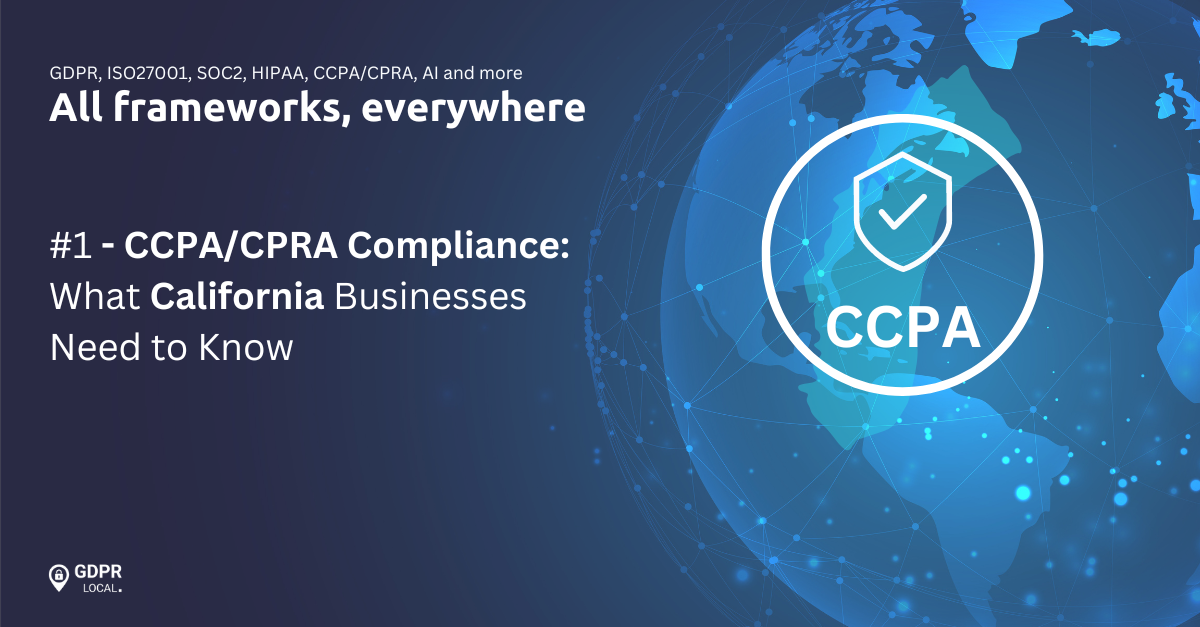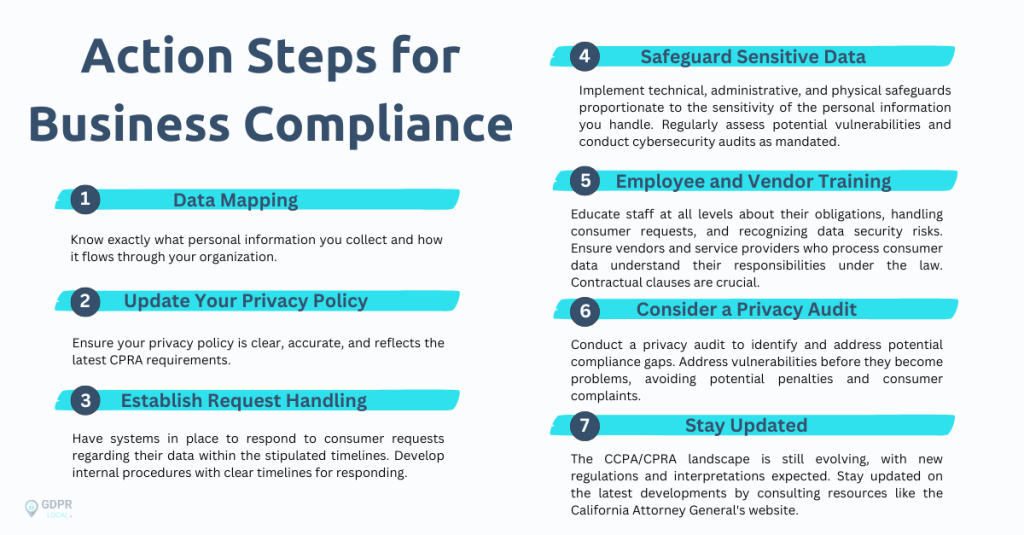
CCPA/CPRA Compliance: What California Businesses Need to Know
California’s privacy framework demands serious attention from businesses operating in the state. These laws grant consumers extensive control over how their personal information is collected, used, and shared. Failing to comply can expose businesses to significant financial penalties and reputational damage. Proactive compliance with the help of experts can safeguard consumer privacy and protect businesses from penalties.
California continues to spearhead the national conversation on data privacy with its evolving regulatory framework, the California Consumer Privacy Act (CCPA) and the California Privacy Rights Act (CPRA). These landmark laws are reshaping how businesses approach data collection and management. As a business, staying compliant with these ever-evolving regulations is not just crucial for operating in California, but also for staying ahead of the curve in building consumer trust. Let’s dive into the key points and latest updates you need to be aware of.
Understanding the Privacy Regime in California
Key Consumer Rights (CCPA/CPRA)
California leads the nation in consumer data privacy with a comprehensive legal framework built upon two landmark laws:
- CCPA (California Consumer Privacy Act): The foundation of California’s privacy law, in effect since 2020, provides consumers with fundamental rights over their personal information;
- CPRA (California Privacy Rights Act): Enacted in 2020 and taking full effect in January 2023, the CPRA significantly strengthens the CCPA.
These laws put consumers in control of their personal information, granting them a wide range of rights that businesses must respect and comply with:
The right to know
Consumers can request detailed information about the personal data a business collects, uses, shares, or sells.
The right to delete
Consumers can request the deletion of their personal information (with exceptions).
The right to opt-out
Consumers have the right to instruct businesses not to sell their personal information.
The right to opt-in (minors)
Businesses must obtain parental consent before selling the personal information of minors under 16.
The right to non-discrimination
Businesses cannot treat consumers differently for exercising their privacy rights.
The right to correct
Consumers can request corrections to inaccurate personal information.
The right to limit sensitive data use
Consumers can limit how businesses use their sensitive personal information (e.g., Social Security number, race, health data).
Latest Crucial Updates
Employee data rights
The CPRA now extends some privacy rights to employees and business contacts. Prior to January 1st, 2023, employee data was largely exempt from CCPA regulations. Now, California employees have some of the same privacy rights as consumers under the CPRA. Employees can exercise their right to know what data is collected about them, request its deletion (with exceptions like legally required records), and opt-out of the sale of their personal information (which may not be applicable in most employment contexts).
B2B data rights
The CPRA also introduced new considerations for business-to-business (B2B) data. Before 2023, B2B data, such as contact details of representatives from vendor companies, wasn’t subject to CCPA. B2B data doesn’t qualify for all CCPA/CPRA rights. The right to know and the right to deletion are applicable, allowing businesses to learn what data is collected about them and potentially request its removal.
Risk assessments & audits
Businesses using sensitive personal information must conduct regular cybersecurity audits and risk assessments. Businesses are required to conduct independent cybersecurity audits at least annually. These audits assess technical, administrative, and physical safeguards for protecting SPI.
Increased penalties
Non-compliance penalties are becoming more severe. Initially, the CCPA allowed for fines of up to $2,500 for each unintentional violation and $7,500 for each intentional violation. The CPRA introduces several changes for businesses to be aware of:
– Fines for violations related to the personal information of minors under 16 can reach up to $7,500, regardless of whether the violation was intentional or unintentional.
– The California Privacy Protection Agency can directly impose fines for CPRA violations, streamlining the process.
– Under the CCPA, businesses had 30 days to address a violation before penalties could be imposed. The CPRA removes this cure period for certain violations, including those involving minors’ data.
Penalties can quickly add up, as each violation pertaining to an individual consumer’s rights can be treated separately. For example, a data breach impacting 1,000 consumers could lead to millions of dollars in fines. Beyond fines, businesses can face lawsuits and regulatory investigations as a result of CCPA/CPRA non-compliance.
Action Steps for Business Compliance

How Can We Help?
CCPA and CPRA are complex laws with ongoing updates and a dedicated resource is essential to navigate the changing requirements effectively. Our privacy professionals offer tailored guidance for CCPA/CPRA compliance that can help you understand CCPA/CPRA requirements with clarity, transforming them into actionable steps designed specifically for your business. We help you understand your obligations and build sustainable privacy practices into your business operations that would protect you from costly compliance risks.
Partner with us to ensure your business thrives while safeguarding consumer privacy. Contact us today for a consultation.